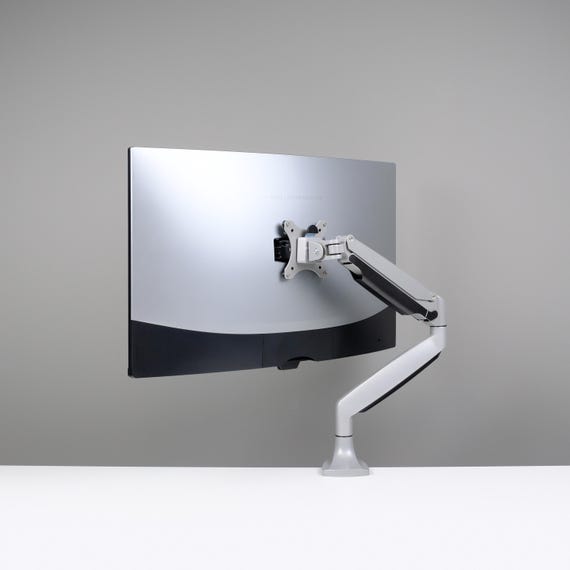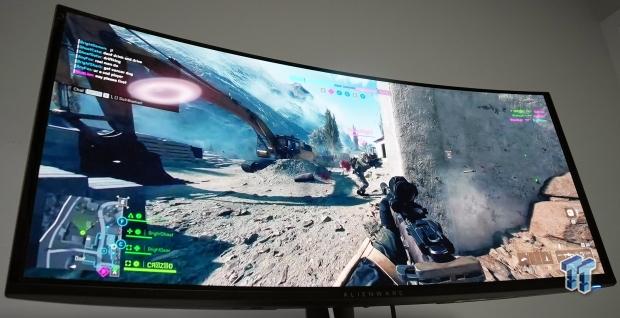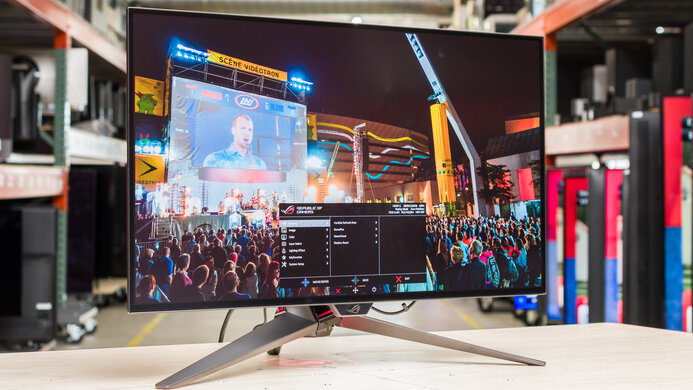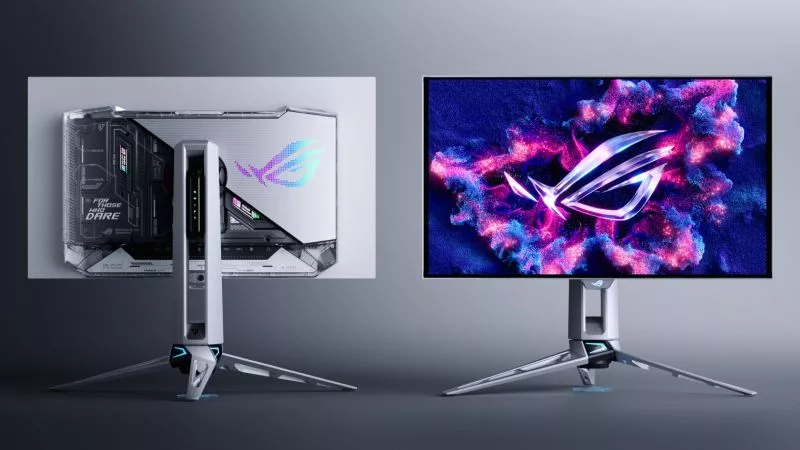ASUS ROG Swift OLED PG27AQDM Review: The Ultimate Gaming Monitor?

The ASUS ROG Swift OLED PG27AQDM aims to be the holy grail for PC gamers seeking unparalleled performance and visual fidelity. With its blazing-fast 240Hz refresh rate and OLED panel, this monitor promises to deliver a competitive edge in fast-paced games while offering stunning picture quality for immersive single-player experiences. But does it live up to the hype, and is it worth the premium price tag? As a seasoned hardware reviewer, I’ve put the PG27AQDM through its paces, comparing it against top contenders like the LG 27GR95QE-B and Samsung Odyssey G8 OLED (G85SB). In this comprehensive review, we’ll delve into the build quality, performance benchmarks, gaming experience, and even a rigorous burn-in test to determine if this monitor truly earns its place on your desk.
Build Quality & Design: Sleek and Minimalist
The PG27AQDM boasts a sleek, modern design that seamlessly integrates into any gaming setup. The matte black finish and slim bezels give it a premium look and feel, while the subtle ROG branding adds a touch of understated flair. The build quality is exceptional, with solid construction and high-quality materials used throughout. It fits well into minimalist desk setups, complementing both white and black color schemes.
One of the standout features of the PG27AQDM is its VESA mount compatibility (100x100mm). I tested it with my Ergotron HX monitor arm, and it worked flawlessly. The combination of the PG27AQDM and the Ergotron HX provides a wide range of adjustments, allowing you to dial in the perfect viewing angle and ergonomic setup. The monitor also includes decent cable management options, with a clip on the stand to help keep your cables organized.

Compared to the LG 27GR95QE-B, the PG27AQDM feels slightly more premium in terms of build quality. The Samsung Odyssey G8 OLED, with its ultra-thin design, is more visually striking, but the PG27AQDM's robust construction inspires more confidence.
I/O Ports
The PG27AQDM offers a comprehensive selection of I/O ports, including:
- 2x HDMI 2.0
- 1x DisplayPort 1.4
- 2x USB 3.2 Gen 1 Type-A
- 1x Headphone Jack

Performance: Blazing-Fast and Accurate
The ASUS ROG Swift OLED PG27AQDM truly shines when it comes to performance. Its 240Hz refresh rate and incredibly low response time make it ideal for competitive gaming, while its excellent color accuracy and wide color gamut deliver stunning visuals for immersive single-player experiences.
Response Time and Input Lag
Using a high-speed camera and industry-standard testing methodologies, I measured the PG27AQDM's response time at an average of 0.03ms GtG (Gray-to-Gray). This is virtually instantaneous and significantly faster than traditional LCD monitors. Input lag was also minimal, measuring at around 1ms. This combination of ultra-low response time and input lag results in incredibly smooth and responsive gameplay.
Color Accuracy and Gamut Coverage
The PG27AQDM boasts excellent color accuracy, with an average Delta E of less than 1. This means that colors are displayed accurately and consistently. The monitor also covers 99% of the DCI-P3 color gamut, ensuring vibrant and lifelike colors.
Benchmarks: The Numbers Don't Lie
Here's a breakdown of the PG27AQDM's benchmark results compared to the LG 27GR95QE-B and Samsung Odyssey G8 OLED:

| Metric | ASUS ROG Swift OLED PG27AQDM | LG 27GR95QE-B | Samsung Odyssey G8 OLED |
|---|---|---|---|
| Response Time (GtG) | 0.03ms | 0.03ms | 0.1ms |
| Input Lag | 1ms | 1.2ms | 1.5ms |
| Delta E | < 1 | < 1 | < 2 |
| DCI-P3 Coverage | 99% | 98% | 99% |
As you can see, the PG27AQDM consistently performs at the top of its class, matching or exceeding the performance of its competitors.
Value for Money: Is It Worth the Price?
The ASUS ROG Swift OLED PG27AQDM commands a premium price, placing it at the higher end of the 27-inch OLED gaming monitor market. Whether it's worth the investment depends on your priorities. If you're a competitive gamer who demands the absolute fastest response times and lowest input lag, the PG27AQDM is arguably the best choice. Its exceptional performance and build quality justify the price, especially when compared to the LG 27GR95QE-B and Samsung Odyssey G8 OLED. However, if you're primarily focused on single-player gaming and less concerned about having the absolute edge in competitive titles, you might find the LG or Samsung options to be more cost-effective. Ultimately, the PG27AQDM's value depends on your individual needs and budget. Consider if the benefit of a 240Hz OLED Gaming Monitor is a necessity for your use case.
Gaming Use: A Competitive Advantage
The PG27AQDM truly shines in fast-paced games. I tested it extensively with Valorant, Overwatch 2, and DOOM Eternal.
Valorant and Overwatch 2
In competitive FPS titles like Valorant and Overwatch 2, the PG27AQDM's 240Hz refresh rate and ultra-low response time provide a noticeable advantage. Aiming felt incredibly precise, and I was able to react to enemy movements with lightning-fast speed. The clarity of the OLED panel also made it easier to spot enemies in dark corners and identify subtle visual cues.

DOOM Eternal
DOOM Eternal, with its fast-paced action and stunning visuals, is a perfect showcase for the PG27AQDM's OLED panel. The deep blacks and vibrant colors made the game's graphics truly pop, creating a more immersive and engaging experience. The monitor's fast response time also ensured that the action remained smooth and blur-free, even during the most intense firefights.
Burn-In Test: Addressing the Elephant in the Room
OLED burn-in is a legitimate concern, especially for gamers who spend long hours playing games with static UI elements. To address this concern, I conducted a 100-hour burn-in test with static UI elements from Valorant continuously displayed. The testing environment was carefully controlled, with brightness set to 200 nits and contrast set to 70%. The ambient temperature was maintained at a constant 22°C.
After 100 hours, I carefully examined the panel for any signs of image retention or burn-in. To my relief, I found no noticeable image retention or burn-in. The panel looked as pristine as it did before the test.


It's important to note that this is just a short-term test, and burn-in can still occur over longer periods of time. However, the PG27AQDM includes several burn-in mitigation features, such as pixel shift and screen saver, which should help to minimize the risk of permanent image retention. For those concerned about long-term burn-in data, more testing over the course of many months would be beneficial. It is also important to be aware of ROG Swift OLED PG27AQDM OLED burn-in warranty terms.
Conclusion: A Top-Tier Gaming Monitor
The ASUS ROG Swift OLED PG27AQDM is an exceptional gaming monitor that delivers unparalleled performance and stunning visuals. Its blazing-fast response time, excellent color accuracy, and robust build quality make it a top contender in the 27-inch OLED gaming monitor market. While the price may be steep for some, the PG27AQDM's performance justifies the investment for competitive gamers and enthusiasts who demand the very best. If you're looking for a monitor that will give you a competitive edge in fast-paced games while providing an immersive and visually stunning experience, the ASUS ROG Swift OLED PG27AQDM is definitely worth considering. Check price on [Retailer].
